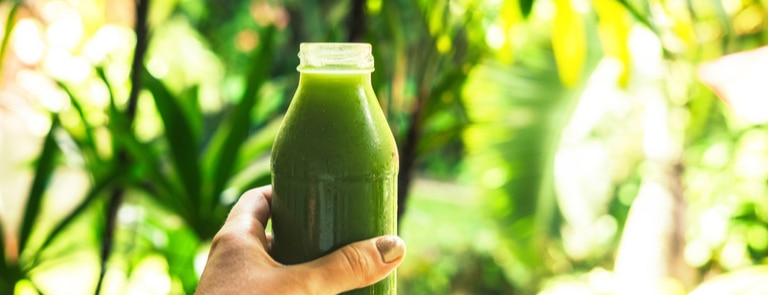15% off €25
Your guide to juice fasting

Juice fasting - or a juice cleanse as it is also known - has become very popular in recent years, as a way to try to detox your body and get more nutrients into your diet.
What is juice fasting?
A juice fast involves consuming only vegetable and fruit juices for a short period of time - usually between one and three days.
Fruits and vegetables are packed full of vitamins, minerals and antioxidants, and juicing makes these nutrients easier to digest.
It is believed that juicing gives the body healing nourishment while also ridding the body of toxins and waste.1
A juice fast means that you only drink these juices during the period of time and abstain from solid foods.
Detox juice cleanses although on some plans you can also add honey or yoghurt to the juices.
You can drink as much water as you want during the diet but you will need to avoid coffee, tea and alcohol.2
Is a juice cleanse diet good or bad for you?
There are conflicting opinions as to whether a juice diet has any real benefits.
Most people do not get enough nutrients from their diets alone and therefore, juicing can be a convenient way to increase your intake of fruit and vegetables into your diet.3
The NHS recommends that you should eat at least five portions of fruit and vegetables per day and juicing is an easy way to add lots of different fruits to one convenient drink.4
A review of various studies found that drinking juice made from fresh fruits and vegetables improved folate and antioxidant levels, including beta carotene, vitamin C and vitamin E.5
However, if you follow a juice fast for longer than more than a couple of days, it is unlikely that it will meet all your nutritional needs.
These juices do not contain all of the fibre which is found in whole fruits and vegetables and you may be missing out on your daily recommended amount of protein too.6
You might not feel great during the cleanse, as your body adjusts to limited calories, therefore you should tone down your exercise routine to conserve your energy.
You should also try to get plenty of rest by going to bed early and taking midday naps if you can.7
A typical juice diet plan
If you are ready to try a juice fast, we have put together this simple juice detox plan for a one day fast which is easy to follow.
You can repeat this on subsequent days, if you would like to try the plan for a 3 day juicing cleanse.
For best results, you should ensure that your juices are raw and organic to really benefit from the nutrients.
Here are some juicing cleanse recipes for you to try.
When you wake up
Warm water with a dash of fresh lemon juice.
9am juice
Green juice, including spinach, celery, kale, romaine, cucumber, green apple and lemon.8
10.30am juice
Vision juice, including carrots, oranges and ginger.9
1pm juice
Spicy lemonade: water, lemons, cayenne pepper, honey or agave syrup.10
3pm juice
Beetroot, apple and carrot juice: beetroot, carrots, apple, ginger, lemon juice.11
5pm juice
Pineapple, apple and mint juice.12
7pm juice
Almond or cashew milk.
How to take your juice on a juice fasting diet
You should aim to drink your juice slowly, to optimise the absorption of nutrients and you should wait a couple of hours between each juice, with the final drink at least three hours before bed time.13
Before and after your juice fast
As juice fasting is quite extreme, it can be a bit of a shock to the body and so it is important that you properly prepare for it.
Starting three to five days before your juice fast, gradually eliminate food such as coffee, refined sugar, meat, dairy, wheat and alcohol.
Also, increase your daily intake of fresh fruit, vegetables and fluids. This will help to reduce cravings.14
After your juice fast has finished, you should eat light meals for a few days and gradually add different foods back in as you go along.15
Other types of juicing
As well as doing a juice fast, there are other ways that you can incorporate more fruit and vegetable juices into your diet.
You can add juices alongside solid foods, as part of a calorie controlled diet, as either a mid-morning or mid-afternoon snack or as a breakfast.
Juice fasting can also be useful as a way of finding out and eliminating foods which you are allergic too or have an intolerance to.16
Last updated: 9 April 2021
- https://www.verywellfit.com/juice-cleanse-89120
- https://susanshain.com/3-day-diy-juice-cleanse-for-travelers/
- https://www.healthline.com/nutrition/juicing-good-or-bad#juicing-for-nutrients
- https://www.nhs.uk/news/food-and-diet/five-a-day-of-fruit-and-veg-is-good-but-10-is-better/
- https://pubmed.ncbi.nlm.nih.gov/22081614/
- https://www.bbcgoodfood.com/howto/guide/what-juice-diet
- https://www.verywellfit.com/juice-cleanse-89120
- https://www.verywellfit.com/green-juice-recipe-88682
- https://www.modernhoney.com/healthy-juice-cleanse-recipes/
- https://susanshain.com/3-day-diy-juice-cleanse-for-travelers/
- https://www.verywellfit.com/beet-carrot-and-apple-juice-recipe-88681
- https://susanshain.com/3-day-diy-juice-cleanse-for-travelers/
- https://www.verywellfit.com/juice-cleanse-89120
- https://www.verywellfit.com/juice-cleanse-89120
- https://www.verywellfit.com/juice-cleanse-89120
- https://juicing-for-health.com/food-allergy-symptoms



